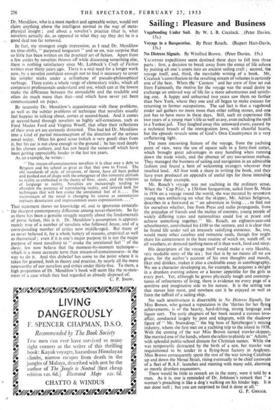Sailing : Pleasure and Business
No Distress Signals. By Winifred Brown. (Peter Davies. 15s.)
YACHTING expeditions seem destined these days to fall into three parts ; first, a decision to break away from the ennui of life ashore by putting all one's assets into an ancient sailing craft ; second, the voyage itself, and, third, the inevitable writing of a book. Mr. Crealock 's contribution to the resulting stream of volumes is certainly one of the best. When th'e Content ' and her crew of four set out from Falmouth, the motive for the voyage was the usual desire to exchange an unloved way of life for a more adventurous and satisfy- ing one. A happy and unhurried two years saw them no farther than New York, where they one and all began to make excuses for returning to former occupations. The sad fact is that a vagabond Under sail gathers no more moss than other rolling stones, and one just has to have moss in these days. Still, such an experience fills two years of a young man's life as well as any, even including the spell in a Yankee jail. They laughed away this untoward event, caused by a technical breach of the immigration laws, with cheerful hearts, but the episode reveals some of God's Own Countrymen in a very unflattering light.
The most interesting feature of the voyage, from the yachting point of view, were the use of square sails in a forty-foot cutter, which brought great advantages in easy handling when running down the trade winds, and the absence of any too-serious mishap. They managed the business of sailing and-navigation in an admirable fashion and found a host of welcoming strangers wherever they touched land. All four took a share in writing the book, and they have even produced an appendix of useful tips for those intending to follow their example.
Mr. Roach's voyage was not yachting in the ordinary sense. When the ' Cap Pilar,' a 130-foot barquentine, sailed from St. Malo in 1936 on a voyage round the world, she was manned by seventeen young men embarking on what the skipper, Mr. Adrian Seligman, describes in a foreword as " an adventure in living . . . to find out for ourselves whether, free from Press and radio propaganda, from the prejudice of friends and the malice of enemies, young people of widely differing types and nationalities could live at peace and achieve something together." Mr. Roach, an eighteen-year-old schoolmaster, contributed his £100 to the venture, and it is clear that he found life under sail an intensely satisfying existence. So, too, would many other carefree and romantic souls, though few might share his contentment in the bare routine of watch on, watch off, in all weathers, or demand nothing more of it than work, food and sleep.
His description of the .voyage itself would make a very likeable, very readable story of the sea ; but that is by no means all we are given, for the author's account of his own thoughts and moods, likes and dislikes, makes it also a creditable essay in autobiography. We see a character developing as, for example, he acquires a delight in a drunken evening ashore or a keener appetithe for the girls in every port. Yet, although he grows physically tough and contemp- tuous of refinements of living, there is evidence on every page of a sensitive and imaginative side to his nature. It is the setting sun that moves him most, and nowhere can it be enjoyed so well as from the taffrail of a sailing ship.
No such sensitiveness is discernible in No Distress Signals, for Miss Brown, who gained a reputation in the 'thirties for her flying achievements, is of the hearty, hard-driving, strong language and liquor sort. The early chapters of her book record a curious love- affair, conducted largely by post and telegram, with the shadowy figure of " Mr. Snowdrop," the big boss of Spitzbergen's mining industry, whom she first met on a yachting trip to the island in 1938. With the coming of the war Miss Brown turned trawler-skipper. She married one of the hands, whom she refers to plainly as" Adams," with splendid public-school distaste for Christian names. While she was temporarily distracted by the birth of a son, her trawler was requisitioned to be tender to a flying-boat factory in Anglesey. Miss Brown consequently spent the rest of the war towing Catalinas up and down the Menai Strait, rising eventually to be chief coxswain of a fleet of R.A.F. launches and meeting with many odd, alarming or merely drunken encounters. There would be little to remark on in, the story, were it told by a man. As it is, one is reminded of Dr. Johnson's remark that " a woman's preaching is like a dog's walking on his hinder legs. It is not done well ; but you are surprised to find it done at all."
G. P. GRIGGS.


































 Previous page
Previous page